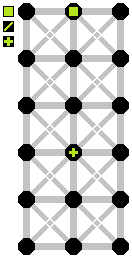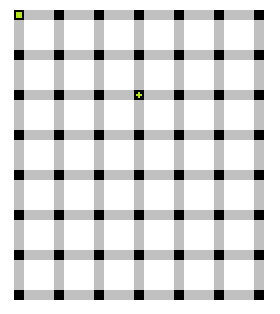The Path Forward
2021 Entries
My Current Thoughts Concerning
Unicursal Maze Research
2021-12-10: What's a "diagonal" maze? As described earlier, a diagonal maze is a maze where you can travel in eight directions (north, north-east, east, south-east, south, south-west, west, north-west) instead of the usual four (north, south, east, west). When I write "diagonal," I'm referring to a "determined diagonal" maze, since it already has an original start and end point before the path is filled in.
Diagonal mazes have three "degrees" to them. I only concentrate on the "1st degree" which are mazes that have original starting and end pairs that are otherwise 'legal' but are impossible to complete unless a diagonal path is used. Here is an example of one such diagonal maze before it's path is filled in:

2021-11-30: What's a "determined" (or, as I sometimes call them, pre-determined) maze? It's a maze that already has it's starting point (the solid square) and the ending point (the green cross) already on the field of points before the path begins to be formed. The end of the path, if you will, is pre-determined and, hence, the name. Here is an example of a determined maze yet to have it's path filled in:

2021-11-25: I have modified the front page to include a picture of a recently completed maze. I hope that displaying these types of paths becomes a regular, almost daily feature. I have also added the "blog" & "primer" pages to the main menu on the left of the index page.
2021-11-21: All journeys must start somewhere and so it may as well start here. And where is here? 'Here' is this blog, where I will prototype sections of the tutorial as well as comment upon my journey to better understand unicursal mazes. Please do not link to this page for I have no idea for how long it shall remain on the internet or even at this very location.
For my first entry, I may as well tell the readers what exactly I do everyday in terms of unicursal path 'research' (and I do consider my daily work on the topic as 'research').
A lot of this list will contain unfamiliar terminology; As more entries are added, the terminology shall become clearer. I apologize for the initial confusion.
Firstly, I complete anywhere between 1 to 7 cycles of determined (or pre-determined) mazes. Why the range? It has to do with how many cycles there are in a row of seven possible mazes in the directory window on my computer. An illustration would convey this concept far easier but, for now, understand that I go through as many as seven and as little as one cycle per day of this type of unicursal maze.
I then complete 1 cycle of diagonal mazes. A diagonal maze is merely one in which there are eight directions instead of the usual four.
I next complete 1 cycle of undetermined mazes. Ever so briefly, an undetermined maze is one in which there is a starting point but there is no initial end point.
From there, I discover 1 new original pair of starting points and end points. From there, I create a new maze template for the original pair that I have found.
Next, I analyze the number of decision points in a particular location on a given type of maze and write down the results for further analysis (and, yes, I have seen patterns in these results and those patterns are fascinating).
Finally, I analyze up to 3 mazes and write down the statistics of these mazes on a spreadsheet for further analysis. I will admit that I will always be perpetually behind on this task from where I currently am but some progress is always better than none.
All of that activity usually takes anywhere between 30 minutes to an hour each day and, with very rare exception, I have been very consistent in performing these tasks. Even when I have not, I have made up for the activity on the very next day.
However, I typically perform some 'extra-curricular' activities much later on in the evening, sometimes even being the very last tasks that I perform before retiring for the night. These tasks are varied but, to name just a few, I also conduct research into 'loops,' 'obstructions,' 'rules' and administrative tasks surrounding the research. Sometimes, these tasks are performed for only a few minutes while others may exceed for as long as perform the routine daily work).